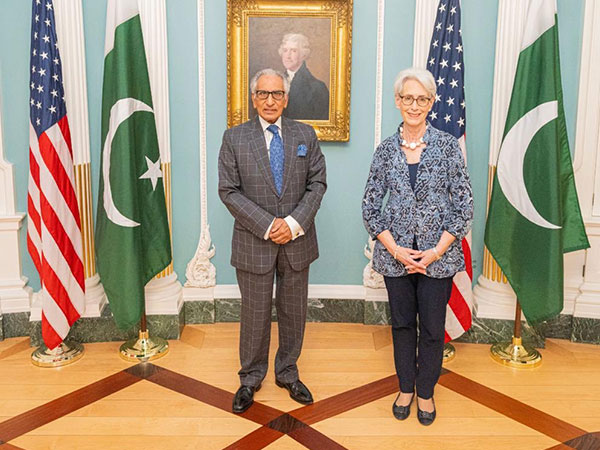Pakistan PM adviser's 'disowned' trip raises concerns among US diplomats
When Pakistan is trying to mend ties with the US for stabilizing the economy and regional policy vis-a-vis Afghanistan, Islamabad's decision to send a prime ministerial advisor to the State Department to seek US support and then terming (disowning) his visit as a "personal" one, has surprised many in Washington's diplomatic circles.

- Country:
- Pakistan
When Pakistan is trying to mend ties with the US for stabilizing the economy and regional policy vis-a-vis Afghanistan, Islamabad's decision to send a prime ministerial advisor to the State Department to seek US support and then terming (disowning) his visit as a "personal" one, has surprised many in Washington's diplomatic circles. Islamabad's decision to send a prime ministerial advisor to the State Department to seek US support for its efforts to revive the economy, and then disown his visit as a "personal" one, has surprised many in Washington's diplomatic circles.
Tariq Fatemi, who is currently serving as special assistant to the prime minister, arrived in the US capital last week and held brainstorming sessions with officials at the Pakistan embassy, including the ambassador. Last week, special assistant to Pakistan's Prime Minister Tariq Fatemi arrived in Washington and he carried out several brainstorming sessions with officials at the Pakistan embassy, including the ambassador, the Dawn newspaper reported.
Fatemi also met US Deputy Secretary of State Wendy Sherman last Thursday to reaffirm their shared goals of expanding relations between the US and Pakistan by enhancing economic and commercial ties. "I met with Special Assistant to the PM of Pakistan Ambassador Fatemi to reaffirm our shared goals of expanding relations through enhancing economic and commercial ties," Sherman said in a tweet.
"We look forward to working together and celebrating 75 years of diplomatic relations," Sherman added. Ned Price, the State Department spokesperson, said that the discussion also focused on the "coordination on Afghanistan, regional stability" and on "the devastating effects of [Russian President] Putin's invasion of Ukraine on food security in Pakistan and worldwide," the publication said.
A press release was issued by the Pakistan embassy and the media in Pakistan also covered the meeting. "Pakistan seeks close and cordial relations with the US on the basis of equality, mutual cooperation and mutual benefit," SAPM Tariq Fatemi stated during his meeting with the US Deputy Secretary of State Wendy Sherman at the State Department as quoted by Pakistan's embassy.
It was believed that Fatemi would arrange a meeting between US President Joe Biden and Prime Minister Shahbaz Sharif during the UN General Assembly in New York, being held in September this year. However, the spokesperson of Pakistan's Foreign Affairs Ministry last Friday disavowed the meeting and said, "Fatemi is on a private visit to Washington and [the] Foreign Office did not play any role in his meeting with US officials".
As a result, several US diplomats expressed concern over Fatemi's visit. The diplomats, including two former Pakistani officials who have served in the US, mentioned that this happened for the second time. The first time it happened was during the so-called Cablegate controversy. "In the first case, a secret diplomatic cable was used to whip up public support for a government that was facing a no-trust move," a senior Pakistani diplomat said.
"In the other case, the government sends a senior official to Washington, apparently to seek support for its efforts to revive the ailing economy but then disowns it, apparently because it fears annoying some quarters," he added as quoted by the local media. "So, why deny it?" a diplomat said adding, "There's nothing earth-shattering in the official statements. Nothing that needed even an explanation, leave alone a denial."
Hassan Abbas, who teaches international relations at Washington's National Defence University, told Dawn that in his opinion, "A personal meeting with an official as senior as a deputy secretary is highly unlikely, particularly in the current situation. Such meetings do not happen without state support." He said that Pakistan changing its position like this "raises unnecessary questions about institutional cohesion in Pakistan at a time when Pakistan needs all kinds of support for its economic stability and regional policy vis-a-vis Afghanistan." (ANI)
(This story has not been edited by Devdiscourse staff and is auto-generated from a syndicated feed.)
ALSO READ
US election: Trump leads Biden in 6 of 7 battleground states, says latest opinion poll
Biden, Netanyahu to speak on phone following Gaza aid workers' deaths
US Domestic News Roundup: Trump loses bid to delay hush money trial until US Supreme Court review; Biden, Senator Bernie Sanders push companies to cut cost of asthma inhalers, prescription drugs and more
Biden speaks with Israel's Netanyahu after strike kills food aid workers
Biden moves to protect civil service as Trump plans to install loyalists










